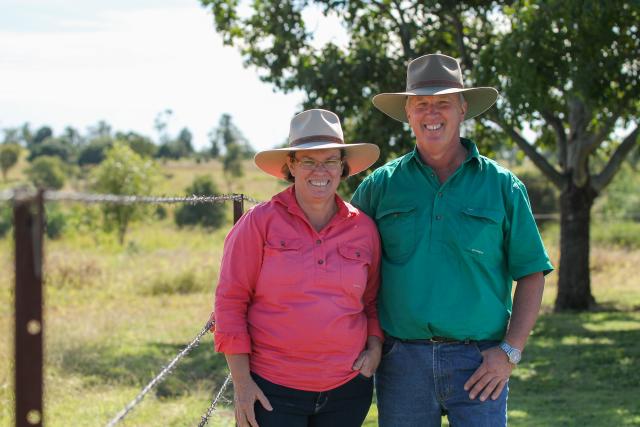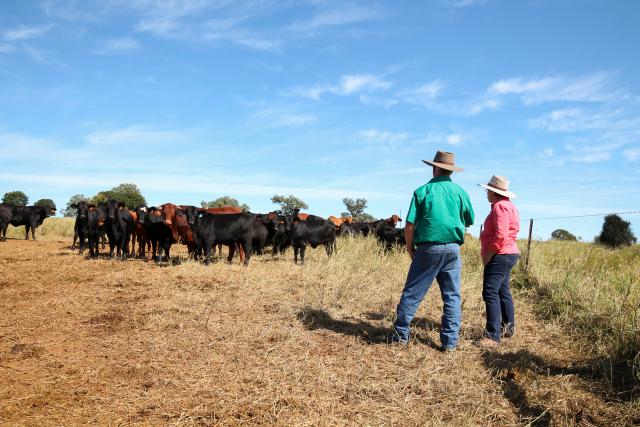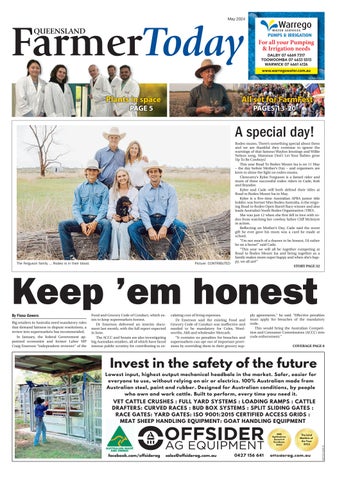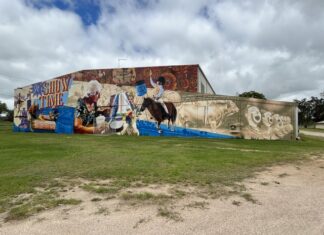Nestled in scrub land 40 kilometres south of Biloela in Lawgi Dawes, Helen and Paul Lovell sit on their back deck with a hot cup of coffee and fresh scones, looking out over their property “Fieldview“.
It’s a dream they’ve been working towards for the past 30 years.
Coming from primary production backgrounds, Helen and Paul have always loved the land.
The couple now runs a beef production enterprise with between 150 and 170 breeders and between 280 and 300 prime cattle across 790 hectares of scrub and forest country.
“We’ve got a diverse range of country here,“ Helen said.
“We’ve got forest country, which is more suitable to the breeders and then our fattening country, which we fatten the progeny on.“
The couple began with only 200ha 33 years ago before later buying an additional 405ha block.
But, as Helen explains, they still needed more land.
“Over the past few years, we had to offload cattle just so we could keep our pastures and our ground cover at a sustainable level,“ she said. “So that we weren’t doing any damage to our land.
“We realised we couldn’t keep our breeder numbers and grow all the progeny through, we needed to expand.“
So, when a nearby block of land became available, Helen and Paul called QRIDA’s regional area manager for Capricornia John Metelli.
“We’d dealt with QRIDA in the past and always found them helpful,“ Helen said. “With the application process, while some people say it’s daunting, it’s not really that difficult.
“John is just a phone call away. He came out before we purchased the last property and ran through some figures with us and guided us in the right direction.
“To have someone to sit down at the kitchen table with us while we explain what we were looking to do and the process – it makes it so much easier than trying to do it over the phone with people you don’t know. You develop a relationship,” Paul said.
Helen and Paul accessed a QRIDA Sustainability Loan to purchase an additional 150ha of land.
“We wanted to get to those levels to be more sustainable and that’s why we bought the extra scrub block just so that we could carry the progeny of those breeders right through to fattening,” Helen said.
“By having that extra land, it makes our enterprise more profitable so that we can have those numbers in the breeders and their progeny coming through, so we’re not overstocking at any point in time.
“It’s all sustainable. We have put a lot of legumes back into the land to enhance those pastures as well, so it’s a win-win for the soil, pastures and the cattle are fattening better on them.”
But achieving this goal wasn’t just about the land.
Both Paul and Helen were still working side jobs off-farm, with the dream of working 100 per cent on-farm. Buying this additional block has allowed Paul to do just that.
“It’s nice to get out of the hum-drum of getting up and going to work every day, working for someone else, whether it be enjoyable or not, there’s a lot more satisfaction in doing it for yourself,” he said.
“The difference for me is I get out of bed because I want to and want to go to work, not because I have to. Everyday has its challenges, but it’s much more satisfying.”
An element of Helen and Paul’s expansion has been about maintaining the quality of the land and leaving it better than how they found it.
Parents to a 23- and 26-year-old who are eager to follow in their footsteps, Paul says education and their children’s futures play a large part in their business decisions.
“You’ve got to be doing what you love to do,“ he said. “Our kids grew up here, we were able to educate them and give them a grounding that I think they can take for life.
“Looking to the future we want to keep this country in as good condition as we can get it, and then hopefully in time with succession planning, bring that through to our family.
“It’s wonderful that they’re both so keen to get back onto the land and, as it is now, they come out to help us brand and fence or whatever we’re doing, they’re here to help and are quite involved with what we do,“ Helen said.
“The kids are keen to adopt the new processes that we have.“
Reflecting on their journey, Helen and Paul say QRIDA has helped make their dreams achievable.
“It’s been more than a 30-odd year plan to get to this point and its finally happening,” Paul said.
“QRIDA has allowed us to build our family enterprise up to a point where we will leave a legacy that is not only sustainable but economical.“
QRIDA offers Sustainability Loans up to $1.3 million for producers looking to invest in the latest infrastructure to create a viable future for their farming business.
This can include buying property or activities that improve farming system sustainability, natural resource sustainability and financial sustainability.










